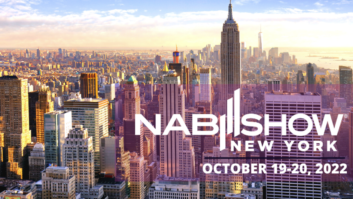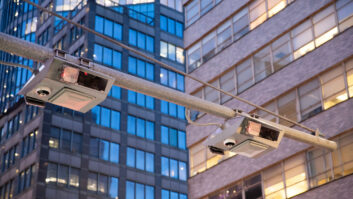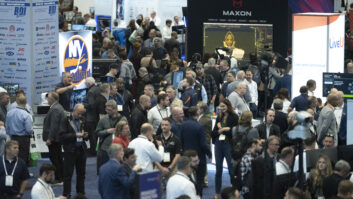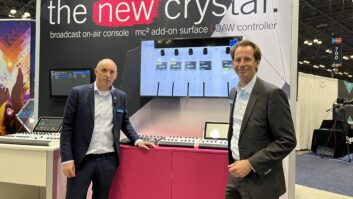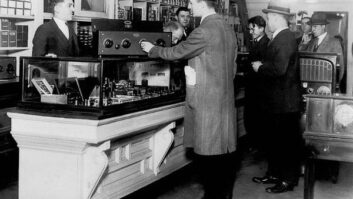GLASGOW, Ky. — In a small market you need to be able do a little of everything to keep a station on the air. It’s not every radio group owner who understands the difference between “in phase” and “out of phase,” has run audio cable into a punchblock or taken apart cart machines for routine maintenance.
Steve Newberry has done all that; but it’s probably not why you know his name.

Steve Newberry still holds down an airshift on Saturday mornings.
The Kentucky Wildcat fan is the president and chief executive officer of privately-held Commonwealth Broadcasting, which has 22 small-market stations in Kentucky. He started his radio career at 14. At 21, he bought his first station, a 250 watt AM daytimer, and upgraded it to 24-hour service with 500 watts.
Newberry will receive the National Radio Award at the Radio Show this month in recognition of his leadership abilities during 25 years as an owner/operator. In June, he completed a two-year term as chair of the joint board of the National Association of Broadcasters, a seat that made him one of the broadcast industry’s most visible spokespeople on Capitol Hill. He also has been the association’s radio chair. He remains on its executive committee and now offers his expertise to board members including Radio Board Chair Caroline Beasley, Joint Board Chair Paul Karpowicz and Television Board Chair Marci Burdick.
Radio World News Editor/Washington Bureau Chief Leslie Stimson spoke with Newberry about issues facing radio.
RW: What do you think of the health of the radio industry?
Newberry: This is a reflection of our performance; I feel much more positive about the radio industry, probably than I have for a couple of years. I’ve always been bullish on it long-term, but we certainly went through a very difficult economic period. It was reflective of the national economy.
With the drop in the stock market yesterday [Aug. 8], I guess, like a lot of other businesspeople and broadcasters, I would say that gives me pause— just as it relates to where we are in terms of the national economy— but I think that we’re seeing a bit of the metamorphosis of the industry right now. I think we’re seeing some transactions beginning to come back into play. I think the operators that are there now are proven by fire, tested, stronger. I know even within our own organization the difficulties of 2008 and 2009 made us do things differently than we had ever really considered, and, frankly have had some very strong, positive results for us. And I think we’re doing a better job serving our communities than we’ve been for awhile.
RW: What’s an example of something Commonwealth has done differently that has worked out for you?
Newberry: What we had to do was really focus on the things that we could control as opposed to the things that were beyond our control. When you lose major national accounts or regional accounts because of what’s going on in the automotive industry [for example] … We re-upped our direct local sales efforts. We became a lot more cognizant of the challenges that were facing our clients. …
RW: What do you think about Pandora and other personalized radio services? Are they an increased threat to local radio advertising, as well as national?
Newberry: I would call it personalized music service, more than a personalized radio service. … I think they are very competitive for iPods, CDs, MP3 players or streams of particular music interests. Do they compete with radio for listenership? Certainly. Just like CDs and cassette tapes and eight-track tapes and everything else did.

At WKVE(AM), Cave City, Ky. in 1979. Newberry bought the station in1984 and changed the calls to WSMJ.
But … if their unique trait is customization, our unique trait is community and connectivity. I believe it’s where we have an opportunity to differentiate ourselves.
When I say I’d call them a customized music service, not customized radio, I’m not trying to downplay their product at all. … But I don’t think that they have that same sense of community or connectivity, the two words I used earlier, that radio does. It’s interesting. People that love Pandora, love Pandora. They want to be on that island. They want to listen to precisely what they want to listen to, when they want to listen to it. But people that love radio, love radio, because they know what’s going on in terms of the community. … It’s not individualized; but radio stations are still very customized in their own way.
RW: Let’s talk about the whole push to get FM chips in cellphones. NAB seems to have now softened its stance, backing off a call for a mandate, and now encouraging wireless companies instead.
Newberry: I think it’s not that NAB has softened its stance, but a year ago, when we were being asked by Congress to find a solution to the performance rights issue, NAB’s belief was, in return for us paying a performance rights fee, we want FM chips in cellphones. So it wasn’t that NAB was trying to mandate FM chips in cellphones just to make the Consumer Electronics Association crazy. It was a, “If this is what you want us to do, this is what we think is a reasonable accommodation.”
So since that performance rights package is now off the table, I think NAB’s position is still very strong. I know NAB’s position is still very strongly advocating FM radios in cellphones because of public safety issues and because of the increasing cost of bandwidth that cellphone carriers are charging their consumers to listen to a Pandora or to an iHeartRadio. The fact that an FM radio would be there, would be free, would be available even in an emergency even if the cellphone networks went down — all those reasons are just as compelling as they were a year ago.
But in this climate, clearly the better way to approach that is market-driven. NAB’s position a year ago was, “If we are being asked to pay a percentage of our revenues that we had not paid previously, then in return for that let’s increase the platform and let’s make sure that radios are available everywhere.” … This year is an entirely different political climate. That doesn’t mean that NAB is any less convinced that FM chips should be in cellphones.
RW: Is the texting notification system the cellphone companies are working on not as good as having an integrated FM chip?
Newberry: I personally believe, having been aware of all the discussions we’ve had at NAB and knowing the facts that I do, that the text messaging system is flawed because of the delivery time and the limitation of information. If you try to send a text message to every cellphone subscriber in America, they all don’t get it instantaneously. It overloads the system. So that is one problem with the current proposal.
The second is, if the cellphone networks go down … then, that whole system disappears. But if you have a radio on the cellphone, even if the cellphone networks are down, the consumer can still access emergency information.
By the way, that is a big difference. Lots of staff people on Capitol Hill will say, “Well I can get your radio station on my cellphone.” You can only get it via Internet streaming. They don’t differentiate those two; but if the Internet fails, you’re out of business of accessing any station … but certainly the ones that in a crisis you might expect to have the most coverage.
RW: Wireless companies say market demand hasn’t shown consumers want FM integrated into their cellphones, while NAB says consumers do. What do you think?
Newberry: My goal is that there’s a radio in every device that has a screen or speakers. Radio ought to be there. To me, it’s not just about radio being on a cellphone. I’d like to have a radio on my iPad. I’d like to have a radio on any piece of technology I have that has a pair of speakers on it, because I think that’s the wise thing for our industry to do, and honestly, I think it’s beneficial to the consumer because it’s a free service that provides information and entertainment. …
You’ve got to have receivers. … You know, I’m also a small-market broadcaster, and I think there are a lot of people, if they had the ability, [would like] to sit in the stands [and] listen to the local broadcast of their high school ballgame on their cellphone. People are not going to carry a transistor radio to the ballgame anymore. There’s one device and it’s your cellphone.
RW: Back to performance rights. The RIAA hasn’t had that bill reintroduced by lawmakers; is that issue status quo right now?
Newberry: I would say the issue is dormant but not dead. I firmly believe it will come back at some point in time. Mitch Bainwol’s departure [as president/CEO] from the RIAA will certainly change the dynamic. Mitch, in good faith, sat down with Gordon Smith and others and looked to find a solution there. But anytime you change leadership of an organization, you are going to expect a different strategy from the new leader.
So a year ago right now if we could have looked ahead and said, “This issue is behind us” and that we would be where we [are] and that the recording industry had not introduced a piece of legislation, I think we would have all been pretty enthused. I think Gordon Smith’s strategy and execution of that strategy — both on the performance rights issue in 2010 and the television spectrum issue in 2011 — have been magnificent. …

Newberry in 1987 in a studio he helped wire at WSMJ(AM), Cave City, the first station he owned.
RW: You sound pleased about Gordon Smith as the leader of NAB.
Newberry: I am really enthused about what Gordon has done at NAB. That would not come as a surprise to anyone, because I was involved very heavily in the selection and spent a lot of time with him during his first couple of years in that role.
What I have found him to be is very smart, very articulate on broadcasting issues. He understands how Capitol Hill works at a level that most of us don’t. He has great gut instincts. …
RW: Were you also on one of the NAB boards when David Rehr was head of the NAB?
Newberry: Yes, I was on the executive committee for three years while David was the CEO. …
RW: What was David Rehr’s style and what is Gordon Smith’s style?
Newberry: David is a more forceful personality. He is one that is very experienced in hard-knuckle politics. He understands the process. He fights very diligently to protect the interests of his constituency. But David will throw down the gauntlet and go to step into the ring to defend his interests. With that come high rewards and … high risk.
Gordon is just as strong an advocate and just as strong a defender, but Gordon will probably try to have a conversation before you get into the ring and say, “You really don’t want to get into the ring with me and make me get into a fight with you because I will win, and if you would like to find a better way to resolve this, I’ll be glad to talk to you.”
RW: How did you get into radio?
Newberry: I was a radio junkie as a child and I can remember when we would go to a local hardware store. The radio station might be doing a broadcast on a Saturday afternoon and my mom would talk about how I would just be mesmerized and not want to go anywhere in the store. I would just sit on a paint can at the entrance to the store and just watch the disc jockeys do their broadcast.
My dad saw the owner of the local radio station at the corner drugstore coffee shop one day and said, “If you ever need somebody to take out trash or do odd jobs at the radio station, my son has an interest.” That man … Clovis Sadler and his wife were kind enough to give me that first opportunity and I was 14, working 24 hours a weekend at the local radio station.
RW: Was that in Kentucky?
Newberry: Yes, Glasgow, where I still live. That’s one thing that has been very fortunate for me, I live on the same farm that I grew up on … but I have been able to be actively be involved in the industry and travel, but still continue to come home here.
RW: What did you do at the radio station … a little of everything? Do you have technical experience?
Newberry: I was an operations guy. I started off as — I won’t say air talent, because talent would be a far stretch from what I possessed — but as a part-time announcer working on the air from 6:15 to 10:15 p.m. on Friday nights; 9 to 11 a.m., 1 to 5 p.m., and 6:15 to 10:15 p.m. on Saturdays; and 2 to 10:15 p.m. on Sundays. That’s a lot of hours for a high school kid, and I loved it. Then, I bought my first station when I was 21, which was a little AM daytime station in a double-wide house trailer. [He made the $130,000 purchase with a combination of a bank loan and $20,000 in operating capital that he contributed, with help from his family.]
RW: What were the call letters?
Newberry: The call letters were WSMJ, which later became a smooth jazz station in Baltimore, but we got the call letters back in the ’80s. … I can remember taking cart machines home and putting them … on my mom’s kitchen table and taking the cart machine out, you know, trying to clean the capstan or polish the heads on it to keep it going, and did some transmitter work.
RW: Transmitter work?
Newberry: Changing tubes. But I will tell you that I thank the good Lord, because I did a lot of things that probably should have gotten me hurt or killed. I was not trained in good safety techniques. The first transmitter of the station I owned was a Gates BC-500 series, battleship grey tube-type transmitter. The first station, when I bought it, was a 250-watt daytime AM at 800 with a two-tower directional [antenna array].
RW: Have you ever wired a studio?
Newberry: Oh, sure. A [few] weeks ago, John David from NAB and Caroline Beasley … were trying to reach me, and I kind of disappeared. The next day we’re on a conference call and they said, “Where were you?” I said, “Truth be told, I was at one of our radio stations in western Kentucky, crawling around on the floor, installing some equipment,” and just kind of doing the things that I love about radio. …

Commonwealth Broadcasting President/CEO Steven Newberry
I should be very clear. … I have had to do [technical] stuff, but I’ve got an engineer [Mike Graham] who keeps me out of trouble. But if it comes to running audio cable into a punchblock, or wiring something or soldering something, or getting a piece of equipment installed, I can certainly do that. But when it comes to any real RF skills or any type of real technical expertise I have to rely on some very, very good people.
RW: How many engineers does Commonwealth have?
Newberry: We have two, both of whom are contract engineers. Of our 22 stations, Mike Graham handles 17. He has a couple of other contract clients, but he’s pretty close to being a full-time guy for us. He moves through three quarters of our company and just does a fabulous job. And in another part of the state that’s a little more remote we have another fellow that is new with us but is doing a terrific job.
RW: Given everything that’s going on in the economy, what’s Commonwealth’s biggest challenge?
Newberry: Stability and growth in the top-line revenue. We have gotten to a point that we have probably the best balance that we’ve ever had of human resources and technical resources and sales resources and automation systems that really help us deliver great products to the communities. … If the economy holds stable — certainly I’d like to see it grow, [but] if it holds stable, I’m okay.
If it dips a bit, I’m still okay. But I guess I’m like everybody else. I’m ready for all of this chaos, this churn, just to stabilize a little bit. … We’re nowhere near the revenue we had at one point, but our profitability is better. We’ve learned how to deal in the new normal.
RW: Are any of your stations transmitting HD Radio?
Newberry: We have one that’s in HD at this point, WOVO(FM), a hot AC, with the primary and two additional channels. … I’ve been to the Consumer Electronics Show, and I’ve talked to the folks in Detroit. Clearly, what excites them about radio, more than anything else, is HD. The automotive industry is more intrigued with and enthusiastic about HD, and I think we have to, as an industry, grow that platform.
I have no vested interest in iBiquity. Our company is not a shareholder. But I think it’s a technology that, whether people like it or whether they don’t … it is what we have. And to argue about whether HD is the right technology or not is kind of arguing about whether FM radio was the right technology. It’s there. That’s the standard now.
But as supportive as I am, we’re like a lot of other people. Our capital expenditure budgets have just been totally flipped upside down in the course of the past three years. … [W]e have them on the air, but we have not added to that mix over the course of the past three years.
RW: So you’ve done one and maybe when the economy improves you’ll think about doing another.
Newberry: Absolutely.
RW: Are you thinking about doing HD conversions just for FM, or would you consider doing AM, too?
Newberry: In my size markets, I don’t really see it, the return on investment for a small-market AM station. … Now, the AM translator rules have made a big difference for us. Where we’ve been able to get some nighttime service for a lot of our AMs. …
I had an outlying Class A that was several miles outside of my main coverage area. I have now made that my third channel on HD and have been able to utilize that for a translator. It’s made that station much more viable and really increased the profile and number of listeners that we’re serving with that product.
RW: You’re feeding a translator with an HD3?
Newberry: That’s right.
RW: And what are the calls?
Newberry: WOVO-HD3 I guess would be the call letters but WHHT is a country station. It’s a Class A and we put it on a C3 HD channel.
RW: What’s your funniest story, either a remote gone bad or a bad sales experience?
Newberry: I was asked by a neighboring broadcaster, who for religious reasons, felt it was inappropriate to work from sunset on Friday night until sunset on Saturday. His play-by-play guy was sick and [asked] if I would mind “coming over and doing this broadcast for me.” I said I’d be glad to. I came over and set up. …
I had a Shure M267 mixer and a 2-1/2 watt Marti going back to the station, and a radio. We were very close to the radio station. The microphones were plugged into the Shure mixer. The output of the Shure was going into the Marti and the headphones were plugged into the radio so we could hear our air monitor.
I’m doing the play-by-play. It’s a basketball game. We’re sitting at the scorer’s table. There was a short in the power outlet so every time a player would jump up from the bench to be brought into the game, the power would go out of this outlet. So the whole game, about every five minutes my radio’s going dead and I’m off the air. I’d have to take off my headphones and jump up, run around the scorer’s table and get it to come back on, and come back around and apologize to the listeners for the difficulty and try to explain it.
Sometime about the fourth quarter … it had probably happened about 15 times in the course of the game, and as I’m taking my headphones off I utter an expletive. Which I should not have.
And when I got back a friend of mine asked: “What was going on during the game?” I said it kept knocking me off the air. He said, “No, it didn’t. You would just disappear.” He said, “You’d be calling the ballgame, and then stop, and then you’d come back and start calling the ballgame again.” He said, “You did it all night. I even heard you say s**t.”
And I’m just panic-stricken. Well, what I learned the hard way was the good old Shure M267 had a battery backup, and the good old Marti transmitter had a battery backup, but the radio that I was monitoring did not.
So that’s my most embarrassing broadcast moment. The man for religious reasons asked me if I would call his ballgame, at which I ended up screaming an expletive in the middle of a high school basketball game.





